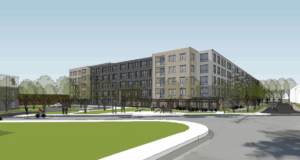
An architect's rendering shows The Davis Companies' 970 Fellsway project in Medford. Image courtesy of The Davis Companies
Large housing developments will see the time they spend in state environmental permitting slashed to just 30 days, under a proposal Gov. Maura Healey unveiled Tuesday.
Housing projects that meet a number of criteria, like proximity to transit, location outside of floodplains and energy efficiency will qualify for expedited review by the the Massachusetts Environmental Policy Act (MEPA) Office under new proposed regulations.
“The vast majority of projects will move from taking a year for review to a month. That’s a big deal,” Healey said. “When contractors and builders are out there struggling with things we can’t control in Massachusetts, this is a way we can help. We know that saving time will help save money.”
A public hearing on the regulations will be held Oct. 14 and 15, with comments due by Oct. 31. If approved, the regulations would go into effect as early as the end of this year.
Healey, Lt. Gov. Kim Driscoll, state Housing Secretary Ed Augustus and a long list of officials and developers made the announcement at the future home of a Davis Companies housing development in Medford Tuesday morning.
The Davis Companies acquired the 3.4-acre 970 Fellsway property, occupied by a self-storage facility, in March 2019 for $25 million. In April 2020, the Boston-based developer submitted plans for a 289-unit housing project under Chapter 40B, the state’s affordable housing law. The company won its appeal before the state Housing Appeals Committee in October 2023 and began demolition on the Fellsway site this summer.
The project includes reuse of 127,000 square feet in the former factory building, construction of a new 5-story apartment building and 11 townhouse-style buildings.
Healey’s office said the new review process means qualifying projects will be able to get their MEPA certification by submitting an Enviromental Notification Form, not the lengthy Environmental Impact Report. The governor credited her Unlocking Housing Production Commission with surfacing the idea.
“This is about cutting red tape so we can cut ribbons on more new housing in this state,” Healey said. “This is about building more housing while still protecting our environment.”
Healey said the new regulations compliment MEPA changes proposed in an environmental spending and policy bill she filed in June, called the “Mass Ready Act.”
Gateway Cities Could Benefit
The Davis Companies Chief Development Officer Michael A. Cantalupa said at Tuesday’s announcement that the 970 Fellsway project got its MEPA approvals in seven months. But some projects’ reviews can last for much longer.
“Predictable and appropriately constrained review timelines help multifamily developments move efficiently from concept to construction to ribbon-cutting, creating more supply and helping to limit developers’ exposure to the type of cyclical market risk that impedes project starts,” he said.
The proposal could give a significant boost to developments in Massachusetts’ 26 largely working-class Gateway Cities, where rents are low enough to make many new developments infeasible.
Cutting down the amount developers there have to spend on consultant fees and interest expenses while their project waits for approval could help more pencil.
Only large developments are commonly required to get environmental approvals via MEPA, but some near “environmental justice” communities in Gateway Cities or inner-city neighborhoods, are forced to go through the approvals process.
A presentation about the proposed changes posted to the state website said 49 housing projects were submitted to the MEPA Office between 2022 and 2025 that needed the expensive Environmental Impact Report review process, 32 of which that qualified because they were in or near “environmental justice communities.”
What Projects Qualify
To qualify for the expedited permitting process announced Tuesday, Healey’s office said, projects must meet several criteria.
At least 67 percent of a project’s floor area must be devoted to residential uses, exclusive of parking and utility spaces, and the remainder devoted to “supportive commercial uses,” and they must be designed to limit the extent of new car trips or be located near transit.
Projects must also meet density thresholds: 8 units per acre for single-family developments, 12 units per acre for two- and three-family buildings and at least 15 units per acre for larger multifamily projects.
In addition, developments must be constructed outside the current floodplain and other “highest hazard areas,” the governor’s office said, and redevelopment projects must build outside highest hazard areas and follow “resilient design principles.”
Projects must also comply with the state’s expensive “stretch” energy code, they must not require significant new water or sewer infrastructure and they can’t require the construction of a new or expanded gas main.
ULI Boston/New England Director Catherine Rollins praised the proposed changes.
“By streamlining reviews for qualifying housing and ecological restoration projects, the Commonwealth is demonstrating that bold climate action and equitable development can go hand in hand,” Rollins said in a statement.





